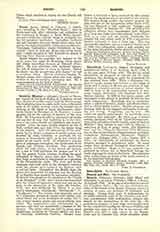

Beyerlinck, LAWRENCE, Belgian theologian and ecclesiastical writer, b. at Antwerp, April, 1578; d. at the same place, June 22, 1627. The son of a noted pharmacist, he prepared at Louvain for the same profession but, deciding to enter the priesthood, he was ordained June, 1602. While a theological student he taught poetry and rhetoric at the college of Vaulx and as pastor of Herent was professor of philosophy at a nearby seminary of canons regular. In 1605 he came to the ecclesiastical seminary of Antwerp, taught philosophy and theology and later became superior. In 1608 he was canon, censor, and theologian of the church of Antwerp; in 1614 he was made protonotary. Beyerlinck was an exemplary priest, a gifted rhetorician, orator, and administrator, and an indefatigable worker. Besides seminary and diocesan work he was engaged continually in preaching and writing. Compilation was his bent. His works are mainly encyclopedic; his knowledge more extensive than profound. He wrote, e.g. a second volume (Antwerp, 1611) of the “Opus Chronographicum orbis universi a mundi exordio usque ad annum MDCXI” (first volume to year 1572 by Opmeer), a collection of lives of popes, rulers, and illustrious men; and the “Magnum Theatrum Vitae Humana, hoc est Rerum Divinarum Humanarumque syntagma Catholicum Philosophicum Historicum Dogmaticum”, etc. (Cologne, 1631, 7 vols.; Venice, 1707, 8 vols.), an encyclopedia of information on diverse subjects arranged in alphabetical order. Its scope ranges from profound theological dissertations to merest trivialities. Much of its vast material was gathered by others, but to Beyerlinck belongs the credit of giving the work its final form. His numerous other publications are listed in the works referred to in the appended bibliography.
JOHN B. PETERSON

